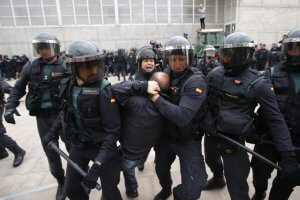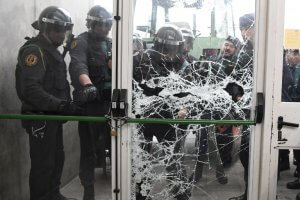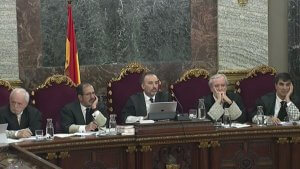Day 38 in the trial of Catalan leaders in the Spanish Supreme Court in Madrid began with testimonies from people who voted in the 1 October 2017 independence referendum, some of whom reported being injured by the Spanish National Police deployed to stop the vote.
Catalan Trial: click here full details of those accused, the charges, and the accusers.
The first witness to take the stand reported seeing ‘very violent conduct’ by Spanish police officers who he said ‘beat people and pulled people by the hair’.
Another witness, Joan Pau Salvadó, said people in his polling station in Sant Carles de la Ràpita put their hands up, said ‘we just want to vote’, and said that without saying any words, the Spanish police began beating them.
Asked why he went to vote that day, Salvadó answered the prosecutors: ‘It was the most important day of my life.’ He also said: ‘I knew that voting wasn’t a crime. And I knew police should protect people, not beat them.’
Salvadó said most people in the polling station knew each other and were very scared. He said some voters fell to the floor and police began beating them on their heads. ‘I saw a lot of blood,’ said Salvadó about when he went to the ambulance after police left.
Albert Salvadó, another witness present in a voting station in Pabellón de la Ràpita, said: ‘The first officers brought people out without violence, but they were forceful. After, more police arrived, who exercised explicit violence. I saw several friends with shirts destroyed with blood.’
ALSO READ: Catalan trial: controversy over ‘rebellion’ and violence
Salvadó also denied any suggestion of violence on behalf of the voters, adding there were insults to police but no threats.
‘I didn’t see any violence on part of the voters. First the police hit us in our midrift and then aimed for our heads afterward. About 30 people sat on the floor and the police brutally beat them,’ Salvadó testified.

The former mayor of Sabadell, Juli Fernàndez, also took the stand. ‘[Spanish police] gave me a blow to my left cheek, my glasses fell to the floor, they dragged me, and when they left me outside, they kicked me twice in the back.’
Fernàndez said he saw ‘no one’ physically opposing letting the police into the polling station. He said he saw ‘people being dragged’ by the officers.
After a recess until 12:30, the trial resumed with the testimony of Jordi Rubinat, who voted in Sant Esteve Sesrovires. ‘We were aware it was a hugely important day in our lives,’ he said.
‘I stayed in the voting station all day because it was such an exceptional day. Nobody ordered me to, it was my own decision,’ Rubinat said. ‘The police arrived and beat people indiscriminately. If they gave any warning, I didn’t hear it, and they didn’t give us time to leave.’
Testifying next was Maria Carme del Rallo, the mayor of San Esteve Sesrovires. ‘The police came in forcefully. I saw them viciously hit a neighbour of mine in the head.’ She also spoke about how the police broke doors in the school where the voting station was.
ALSO READ: ‘Fairy trap’ goes viral after Enric Millo’s testimony
Next up was Emili Gaya, who was also present in the voting station in Sant Esteve Sesrovires. ‘The police arrived at 6pm, when we thought they weren’t going to show up. They arrived in a formation that nobody had ever seen before. They hit me in the head and I fell.’
Gaya explained: ‘The police charge was completely disproportionate. We sang “We are people of peace” as they beat us. I fell to the floor and people tried to help me up, and police began beating those trying to help me. There were a lot of tears that day.’
Gaya said that nobody in the voting station hit police, but only tried to protect themselves against an ‘aggression’ from police they didn’t expect.

Up next to testify was Ferran Soler, who voted in Dosrius, and was treated by health services for injuries he received that day.
‘At the school, a police sergeant punched me in the face that split my brow open, and hit me with the baton that injured my finger. People screamed and I saw how another policeman, with dark glasses, punched another person who was not doing anything,’ said Soler.
‘At no point did we try to prevent the police from taking the ballot box because we knew they were going to do it, we just wanted to show our disagreement,’ continued Ferran Soler.
Next to testify was Marc Puigtió, mayor of Sant Julià de Ramis during the referendum. ‘I went to the voting station first thing in the morning, there were a lot of journalists as it’s where president Puigdemont was to vote. But the police came first.’
‘The Spanish police arrived and started beating people immediately. They left people unconscious and wouldn’t let the ambulance arrive. There were more Guardia Civil Spanish police than there were voters,’ Puigtió explained.
In the afternoon session of the trial, Laura Castell testified first. She told the court how police beat her from behind, giving her ‘no chance of anticipating’ the hit. She explained she was taking photographs at the time, ‘not threatening’.
ALSO READ: Right to defence being undermined, say lawyers
‘It was surprising because even though the ballot boxes had already been confiscated, the riot police didn’t leave. I then heard two shots and they began beating us. The violence was extreme and indiscriminate,’ she said.
Jordi Salvador, an MP for Esquerra Republicana (ERC), testified next. He said he identified himself to the Spanish police in his voting station, but that made no difference to police. ‘They grabbed me and beat me. In all my life I never saw anything like it.’
Jordina Carbó, a citizen who voted in Barcelona, testified that she and others in her voting station helped police with confiscating the voting material, adding ‘we didn’t offer any resistance.’
Carbó explained that she saw a Spanish police officer approach a pregnant woman, and when a man put himself in front of her, the police officer threw him to the ground.

‘Police officers broke into the polling places and smashed open the doors with a sledgehammer. Nobody injured any police officers; I saw everything with my own eyes,’ said Jordi Torrent, a referendum voter in Sant Cebrià de Vallalta.
Jordina Freixanet, who witnessed the police operation against the independence referendum at a polling place in Alcarràs, said she didn’t see any citizen attacking police officers.
‘Police officers were beating a 65-year old woman who was on the ground. I told them to stop, that they were mad. They started beating me,’ said Ramon Antoni Forteza, a witness at a polling place in Lleida on 1 October 2017.
David Elvira, the head of the Catalan health service (CatSalut) during the independence referendum, also testified, saying 1,066 people were attended by health workers, including 12 police officers. The most common diagnosis: contusions, multiple injuries, traumas and fractures.
Pere García, the head of the main Catalan police union, recalled officers feeling worried about the independence referendum. ‘Some remarks by politicians, including the interior minister, didn’t help,’ he said, and added: ‘We made it clear that we would comply with court orders.’
The trial will resume on Monday 6 May at 10am.
Catalan Trial: click here full details of those accused, the charges, and the accusers.
Click here for all articles and updates on the Catalan Trial
ALSO READ: Catalan Trial: Day 37 summary
ALSO READ: Catalan Trial: Day 36 summary
ALSO READ: Catalan Trial: Day 35 summary
ALSO READ: Catalan Trial: Day 34 summary
ALSO READ: Catalan Trial: Day 33 summary
ALSO READ: Catalan Trial: Day 32 summary
ALSO READ: Catalan Trial: Day 31 summary
ALSO READ: Catalan Trial: Day 30 summary
ALSO READ: Catalan Trial: Day 29 summary
ALSO READ: Catalan Trial: Day 28 summary
ALSO READ: Catalan Trial: Day 27 summary
ALSO READ: Catalan Trial: Day 26 summary
ALSO READ: Catalan Trial: Day 25 summary
ALSO READ: Catalan Trial: Day 24 summary
ALSO READ: Catalan Trial: Day 23 summary
ALSO READ: Catalan Trial: Day 22 summary
ALSO READ: Catalan Trial: Day 21 summary
ALSO READ: Catalan Trial: Day 20 summary
ALSO READ: Catalan Trial: Day 19 summary
ALSO READ: Catalan Trial: Day 18 summary
ALSO READ: Catalan Trial: Day 17 summary
ALSO READ: Catalan Trial: Day 16 summary
ALSO READ: Catalan Trial: Day 15 summary
ALSO READ: Catalan Trial: Day 14 summary
ALSO READ: Catalan Trial: Day 13 summary
ALSO READ: Catalan Trial: Day 12 summary
ALSO READ: Catalan Trial: Day 11 summary
ALSO READ: Catalan Trial: Day 10 summary
ALSO READ: Catalan Trial: Day 9 summary
ALSO READ: Catalan Trial: Day 8 summary
ALSO READ: Catalan Trial: Day 7 summary
ALSO READ: Catalan Trial: Day 6 summary
ALSO READ: Catalan Trial: Day 5 summary
ALSO READ: Catalan Trial: Day 4 summary
ALSO READ: Catalan Trial: Day 3 summary
ALSO READ: Catalan Trial: Day 2 summary
ALSO READ: Catalan Trial: Day 1 summary
